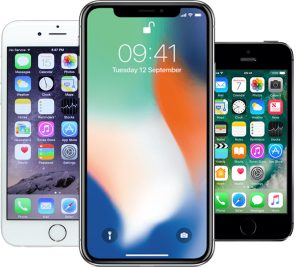Scroll with care: how social media ruins the brain
Instagram is one of the most popular social media sites for teenagers. Many can be seen mindlessly scrolling for hours.
October 14, 2018
Someone snaps a picture of themself, and swipes through the filters until they find the right one. Post. Hours later, still no one has liked their picture. They thought the picture was okay, but now they look at it again and see all their flaws.They feel ugly and will second guess everything before they post again.
According to hhs.gov, 71 percent of teens say that they are on more than one social media sites. Social media definitely has a big presence in teen’s lives, but is it a good presence or a bad presence? Because it can cause anxiety, body image concerns, and limit friends, social media has a definite negative impact on mental health.
Studies show that social media can cause or worsen anxiety disorders like Social Anxiety Disorder (SAD). For example, according to Common Sense Media, 24% of teens report feeling stressed out about how they look when they post photos online, and 45% of teen girls worry about other people posting ugly photos of them online. All of this extra stress in order to stay connected? Is it really worth it? In addition, when someone sees others post with their friends but not them, they can also feel left out, which leads to fear of missing out again on a later date or feelings of social isolation.
In addition, social media causes body image concerns. When someone sees everyone on social media looking amazing, it makes them feel bad about themself. Also, if they are using a filter on everything that they post, or editing before they post, it can create a fake persona of themself and can actually make them feel worse. This means that even if someone is getting compliments and likes on their photo, it can still make them feel bad about themselves, because they are getting complimented on a fake image. If this happens, the person will think, “They’re only liking it because that’s not the real me.” However, they still continue to post edited pictures because that is what their followers have come to expect. Even if someone doesn’t edit their photos, pictures of celebrities that are edited to have an unattainable body image can cause people to feel bad about their own body.
Then there is friends. Social media’s purpose is to stay connected, but in fact it hurts friendships rather than helps. In fact, according to Scholastic Choices magazine, being on social media for two hours or more a day makes someone two times as likely to feel socially isolated. There is, of course, the fear of missing out. Even if someone was invited to an event but chose not to go, seeing post after post of their friends having fun without them can still make them feel left out and betrayed. Also, starting an online conversation with a friend is so easy compared to actually meeting them and talking face to face. This allows people to miss out on important activities that make them and their friends become closer.
Some claim that social media brings people closer together and allows people to make more friends that they never would have met otherwise. However, since people tend to only post their best self on social media, all conversations with other people can feel shallow and not real. And if someone is spending all of their time keeping up with their hundreds of followers, they are passing up more meaningful, long term friendships. This means that even though social media connects people, it only fosters many shallow relationships and causes people to miss out on more valuable, though fewer in number, real life relationships.
The moral is not to stop using social media altogether, or stop talking to people who you only know digitally. Almost everyone uses social media, and it takes a huge amount of courage and self-control to quit social media. But every once in a while, people need to take a moment to step back and analyze if the good benefits of social media are outweighing the strain on their mental health. If social media is causing someone stress, anxiety, self-esteem and body-image issues, or costing you valuable friendships, maybe it’s time to reevaluate how and how much they use it. As author Erik Qualman says, “We don’t have a choice on whether we do social media, the question is how well we do it.”










Kaylynn Dodge • Oct 18, 2018 at 1:25 pm
This is very deep and actually very true. I love the information that backs up this information. It’s very important. You also write beautifully.
Malin • Oct 17, 2018 at 1:27 pm
This is so interesting to read, I never thought there were so many researchs about what it actually causes in the brain and the body. Many facts, good structure and flow. Great job!